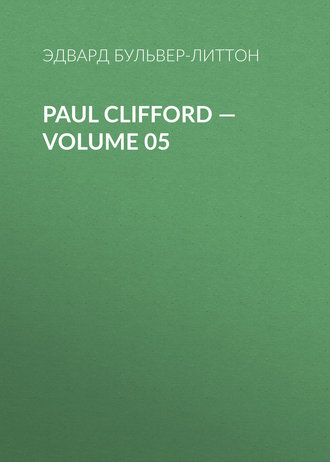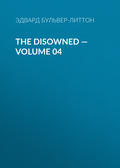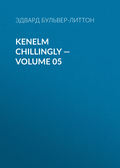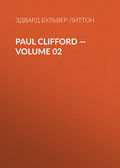
Эдвард Бульвер-Литтон
Paul Clifford — Volume 05
"By no means improbable! You mean the inns and the turnpikes?" rejoined Mauleverer.
"Your lordship is pleased to be facetious; no! I meant something worse than them."
"What! the cooks?"
"No, my lord, the highwaymen!"
"The highwaymen! indeed?" said Mauleverer, anxiously; for he had with him a case of diamonds, which at that time were on grand occasions often the ornaments of a gentleman's dress, in the shape of buttons, buckles, etc. He had also a tolerably large sum of ready money about him,—a blessing he had lately begun to find very rare. "By the way, the rascals robbed me before on this very road. My pistols shall be loaded this time. Mr. Cheerly, you had better order the horses; one may as well escape the nightfall."
"Certainly, my lord, certainly.—Jem, the horses immediately!—Your lordship will have another cutlet?"
"Not a morsel!"
"A tart?"
"A dev—! not for the world!"
"Bring the cheese, John!"
"Much obliged to you, Mr. Cheerly, but I have dined; and if I have not done justice to your good cheer, thank yourself and the highwaymen. Where do these highwaymen attack one?"
"Why, my lord, the neighbourhood of Reading is, I believe, the worst part; but they are very troublesome all the way to Salthill."
"Damnation! the very neighbourhood in which the knaves robbed me before! You may well call them troublesome! Why the deuce don't the police clear the country of such a movable species of trouble?"
"Indeed, my lord, I don't know; but they say as how Captain Lovett, the famous robber, be one of the set; and nobody can catch him, I fear!"
"Because, I suppose, the dog has the sense to bribe as well as bully. What is the general number of these ruffians?"
"Why, my lord, sometimes one, sometimes two, but seldom more than three."
Mauleverer drew himself up. "My dear diamonds and my pretty purse!" thought he; "I may save you yet!"
"Have you been long plagued with the fellows?" he asked, after a pause, as he was paying his bill.
"Why, my lord, we have and we have not. I fancy as how they have a sort of a haunt near Reading, for sometimes they are intolerable just about there, and sometimes they are quiet for months together! For instance, my lord, we thought them all gone some time ago; but lately they have regularly stopped every one, though I hear as how they have cleared no great booty as yet."
Here the waiter announced the horses, and Mauleverer slowly re-entered his carriage, among the bows and smiles of the charmed spirits of the hostelry.
During the daylight Mauleverer, who was naturally of a gallant and fearless temper, thought no more of the highwaymen,—a species of danger so common at that time that men almost considered it disgraceful to suffer the dread of it to be a cause of delay on the road. Travellers seldom deemed it best to lose time in order to save money; and they carried with them a stout heart and a brace of pistols, instead of sleeping all night on the road. Mauleverer, rather a preux chevalier, was precisely of this order of wayfarers; and a night at an inn, when it was possible to avoid it, was to him, as to most rich Englishmen, a tedious torture zealously to be shunned. It never, therefore, entered into the head of our excellent nobleman, despite his experience, that his diamonds and his purse might be saved from all danger if he would consent to deposit them, with his own person, at some place of hospitable reception; nor, indeed, was it till he was within a stage of Reading, and the twilight had entirely closed in, that he troubled his head much on the matter. But while the horses were putting to, he summoned the postboys to him; and after regarding their countenances with the eye of a man accustomed to read physiognomies, he thus eloquently addressed them,—
"Gentlemen, I am informed that there is some danger of being robbed between this town and Salthill. Now, I beg to inform you that I think it next to impossible for four horses, properly directed, to be stopped by less than four men. To that number I shall probably yield; to a less number I shall most assuredly give nothing but bullets. You understand me?"
The post-boys grinned, touched their hats; and Mauleverer slowly continued,—
"If, therefore,—mark me!—one, two, or three men stop your horses, and I find that the use of your whips and spurs are ineffectual in releasing the animals from the hold of the robbers, I intend with these pistols— you observe them!—-to shoot at the gentlemen who detain you; but as, though I am generally a dead shot, my eyesight wavers a little in the dark, I think it very possible that I may have the misfortune to shoot you, gentlemen, instead of the robbers! You see the rascals will be close by you, sufficiently so to put you in jeopardy, unless indeed you knock them down with the but-end of your whips. I merely mention this, that you may be prepared. Should such a mistake occur, you need not be uneasy beforehand, for I will take every possible care of your widows; should it not, and should we reach Salthill in safety, I intend to testify my sense of the excellence of your driving by a present of ten guineas apiece! Gentlemen, I have done with you. I give you my honour that I am serious in what I have said to you. Do me the favour to mount."
Mauleverer then called his favourite servant, who sat in the dickey in front (rumble-tumbles not being then in use). "Smoothson," said he, "the last time we were attacked on this very road, you behaved damnably. See that you do better this time, or it may be the worse for you. You have pistols to-night about you, eh? Well, that's right! And you are sure they're loaded? Very well! Now, then, if we are stopped, don't lose a moment. Jump down, and fire one of your pistols at the first robber. Keep the other for a sure aim. One shot is to intimidate, the second to slay. You comprehend? My pistols are in excellent order, I suppose. Lend me the ramrod. So, so! No trick this time!"
"They would kill a fly, my lord, provided your lordship fired straight upon it."
"I do not doubt you," said Mauleverer; "light the lanterns, and tell the postboys to drive on."
It was a frosty and tolerably clear night. The dusk of the twilight had melted away beneath the moon which had just risen, and the hoary rime glittered from the bushes and the sward, breaking into a thousand diamonds as it caught the rays of the stars. On went the horses briskly, their breath steaming against the fresh air, and their hoofs sounding cheerily on the hard ground. The rapid motion of the carriage, the bracing coolness of the night, and the excitement occasioned by anxiety and the forethought of danger, all conspired to stir the languid blood of Lord Mauleverer into a vigorous and exhilarated sensation, natural in youth to his character, but utterly contrary to the nature he had imbibed from the customs of his manhood.
He felt his pistols, and his hands trembled a little as he did so,—not the least from fear, but from that restlessness and eagerness peculiar to nervous persons placed in a new situation.
"In this country," said he to himself, "I have been only once robbed in the course of my life. It was then a little my fault; for before I took to my pistols, I should have been certain they were loaded. To-night I shall be sure to avoid a similar blunder; and my pistols have an eloquence in their barrels which is exceedingly moving. Humph, another milestone! These fellows drive well; but we are entering a pretty- looking spot for Messieurs the disciples of Robin Hood!"
It was, indeed, a picturesque spot by which the carriage was now rapidly whirling. A few miles from Maidenhead, on the Henley Road, our readers will probably remember a small tract of forest-like land, lying on either side of the road. To the left the green waste bears away among the trees and bushes; and one skilled in the country may pass from that spot, through a landscape as little tenanted as green Sherwood was formerly, into the chains of wild common and deep beech-woods which border a certain portion of Oxfordshire, and contrast so beautifully the general characteristics of that county.
At the time we speak of, the country was even far wilder than it is now; and just on that point where the Henley and the Reading roads unite was a spot (communicating then with the waste land we have described), than which, perhaps, few places could be more adapted to the purposes of such true men as have recourse to the primary law of nature. Certain it was that at this part of the road Mauleverer looked more anxiously from his window than he had hitherto done, and apparently the increased earnestness of his survey was not altogether without meeting its reward.
About a hundred yards to the left, three dark objects were just discernible in the shade; a moment more, and the objects emerging grew into the forms of three men, well mounted, and riding at a brisk trot.
"Only three!" thought Mauleverer, "that is well;" and leaning from the front window with a pistol in either hand, Mauleverer cried out to the postboys in a stern tone, "Drive on, and recollect what I told you!— Remember!" he added to his servant. The postboys scarcely looked round; but their spurs were buried in their horses, and the animals flew on like lightning.
The three strangers made a halt, as if in conference; their decision was prompt. Two wheeled round from their comrade, and darted at full gallop by the carriage. Mauleverer's pistol was already protruded from the front window, when to his astonishment, and to the utter baffling of his ingenious admonition to his drivers, he beheld the two postboys knocked from their horses one after the other with a celerity that scarcely allowed him an exclamation; and before he had recovered his self- possession, the horses taking fright (and their fright being skilfully taken advantage of by the highwaymen), the carriage was fairly whirled into a ditch on the right side of the road, and upset. Meanwhile Smoothson had leaped from his station in the front; and having fired, though without effect, at the third robber, who approached menacingly towards him, he gained the time to open the carriage door and extricate his master.
The moment Mauleverer found himself on terra firma, he prepared his courage for offensive measures; and he and Smoothson, standing side by side in front of the unfortunate vehicle, presented no unformidable aspect to the enemy. The two robbers who had so decisively rid themselves of the postboys acted with no less determination towards the horses. One of them dismounted, cut the traces, and suffered the plunging quadrupeds to go whither they listed. This measure was not, however, allowed to be taken with impunity; a ball from Mauleverer's pistol passed through the hat of the highwayman with an aim so slightly erring that it whizzed among the locks of the astounded hero with a sound that sent a terror to his heart, no less from a love of his head than from anxiety for his hair. The shock staggered him for a moment; and a second shot from the hands of Mauleverer would have probably finished his earthly career, had not the third robber, who had hitherto remained almost inactive, thrown himself from his horse, which, tutored to such docility, remained perfectly still, and advancing with a bold step and a levelled pistol towards Mauleverer and his servant, said in a resolute voice, "Gentlemen, it is useless to struggle; we are well armed, and resolved on effecting our purpose. Your persons shall be safe if you lay down your arms, and also such part of your property as you may particularly wish to retain; but if you resist, I cannot answer for your lives!"
Mauleverer had listened patiently to this speech in order that he might have more time for adjusting his aim. His reply was a bullet, which grazed the side of the speaker and tore away the skin, without inflicting any more dangerous wound. Muttering a curse upon the error of his aim, and resolute to the last when his blood was once up, Mauleverer backed one pace, drew his sword, and threw himself into the attitude of a champion well skilled in the use of the instrument he wore.
But that incomparable personage was in a fair way of ascertaining what happiness in the world to come is reserved for a man who has spared no pains to make himself comfortable in this. For the two first and most active robbers having finished the achievement of the horses, now approached Mauleverer; and the taller of them, still indignant at the late peril to his hair, cried out in a stentorian voice,—
"By Jove! you old fool, if you don't throw down your toasting-fork, I'll be the death of you!"
The speaker suited the action to the word by cocking an immense pistol. Mauleverer stood his ground; but Smoothson retreated, and stumbling against the wheel of the carriage, fell backward; the next instant, the second highwayman had possessed himself of the valet's pistols, and, quietly seated on the fallen man's stomach, amused himself by inspecting the contents of the domestic's pockets. Mauleverer was now alone; and his stubbornness so enraged the tall bully that his hand was already on his trigger, when the third robber, whose side Mauleverer's bullet had grazed, thrust himself between the two.
"Hold, Ned!" said he, pushing back his comrade's pistol. "And you, my lord, whose rashness ought to cost you your life, learn that men can rob generously." So saying, with one dexterous stroke from the robber's riding-whip, Mauleverer's sword flew upwards, and alighted at the distance of ten yards from its owner.
"Approach now," said the victor to his comrades. "Rifle the carriage, and with all despatch!"
The tall highwayman hastened to execute this order; and the lesser one having satisfactorily finished the inquisition into Mr. Smoothson's pockets, drew forth from his own pouch a tolerably thick rope; with this he tied the hands of the prostrate valet, moralizing as he wound the rope round and round the wrists of the fallen man, in the following edifying strain:—
"Lie still, sir,—lie still, I beseech you! All wise men are fatalists; and no proverb is more pithy than that which says, 'What can't be cured must be endured.' Lie still, I tell you! Little, perhaps, do you think that you are performing one of the noblest functions of humanity; yes, sir, you are filling the pockets of the destitute; and by my present action I am securing you from any weakness of the flesh likely to impede so praiseworthy an end, and so hazard the excellence of your action. There, sir, your hands are tight,—lie still and reflect."
As he said this, with three gentle applications of his feet, the moralist rolled Mr. Smoothson into the ditch, and hastened to join his lengthy comrade in his pleasing occupation.
In the interim Mauleverer and the third robber (who, in the true spirit of government, remained dignified and inactive while his followers plundered what he certainly designed to share, if not to monopolize) stood within a few feet of each other, face to face.
Mauleverer had now convinced himself that all endeavour to save his property was hopeless, and he had also the consolation of thinking he had done his best to defend it. He therefore bade all his thoughts return to the care of his person. He adjusted his fur collar around his neck with great sang froid, drew on his gloves, and, patting his terrified poodle, who sat shivering on its haunches with one paw raised and nervously trembling, he said,—
"You, sir, seem to be a civil person, and I really should have felt quite sorry if I had had the misfortune to wound you. You are not hurt, I trust. Pray, if I may inquire, how am I to proceed? My carriage is in the ditch, and my horses by this time are probably at the end of the world."
"As for that matter," said the robber, whose face, like those of his comrades, was closely masked in the approved fashion of highwaymen of that day, "I believe you will have to walk to Maidenhead,—it is not far, and the night is fine!"
"A very trifling hardship, indeed!" said Mauleverer, ironically; but his new acquaintance made no reply, nor did he appear at all desirous of entering into any further conversation with Mauleverer.
The earl, therefore, after watching the operations of the other robbers for some moments, turned on his heel, and remained humming an opera tune with dignified indifference until the pair had finished rifling the carriage, and seizing Mauleverer, proceeded to rifle him.
With a curled lip and a raised brow, that supreme personage suffered himself to be, as the taller robber expressed it, "cleaned out." His watch, his rings, his purse, and his snuff-box, all went. It was long since the rascals had captured such a booty.
They had scarcely finished when the postboys, who had now begun to look about them, uttered a simultaneous cry, and at some distance a wagon was seen heavily approaching. Mauleverer really wanted his money, to say nothing of his diamonds; and so soon as he perceived assistance at hand, a new hope darted within him. His sword still lay on the ground; he sprang towards it, seized it, uttered a shout for help, and threw himself fiercely on the highwayman who had disarmed him; but the robber, warding off the blade with his whip, retreated to his saddle, which he managed, despite of Mauleverer's lunges, to regain with impunity.
The other two had already mounted, and within a minute afterwards not a vestige of the trio was visible. "This is what may fairly be called single blessedness!" said Mauleverer, as, dropping his useless sword, he thrust his hands into his pockets.
Leaving our peerless peer to find his way to Maidenhead on foot, accompanied (to say nothing of the poodle) by one wagoner, two postboys, and the released Mr. Smoothson, all four charming him with their condolences, we follow with our story the steps of the three alieni appetentes.







